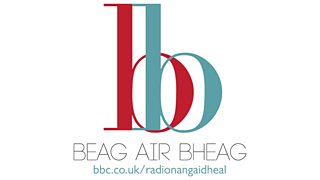Oisean a' Ghrà mair: Sreath 8: 5
CRIOMAG: ‘Deasbad nan Sgoiltean’

1. A’ bruidhinn ri daoine | Addressing people
Claire Frances NicNèill:
“A Chathraiche, a mhnathan ‘s a dhaoine-uaisle, tha sinne gu làidir airson a’ mholaidh.”
“Chair, ladies and gentlemen, we strongly support the motion.”
cathraiche - ‘a chair, chairperson’
mnathan - ‘women, ladies’
daoin’-uaisle - ‘noblemen, gentlemen’
A’ bruidhinn riutha (addressing them):
Cathraiche → A Chathraiche
mnathan → A mhnathan
daoin’-uaisle → A dhaoin’-uaisle.
Feasgar math a chàirdean.
‘Good evening, folks/friends.’
càirdean → a chàirdean
caraid → a charaid
Ciamar a tha thu, a charaid? ‘How are you, my friend?’
balach → a bhalaich
Dè tha dol a bhalaich? ‘What’s doing, lad/pal?’
gràdh → a ghràidh
Dè tha ceàrr a ghràidh? ‘What’s wrong, love/pet?’
Ainmean Gàidhlig fireann (male names):
Cailean → a Chailein
Dè do chor a Chailein? ‘How are you, Colin?’
Dòmhnall → a Dhòmhnaill
Trobhad an seo a Dhòmhnaill. ‘Come here, Donald.’
Murchadh → a Mhurchaidh
Innis dhomh a Mhurchaidh. ‘Tell me, Murdo.’
Pàdraig → a Phàdraig
Dè do bheachd a Phàdraig? ‘What do you think, Peter/ Patrick?’
Seumas → a Sheumais
An robh thusa aig a’ chonsart a Sheumais? ‘Were you at the concert, James?’
Teàrlach → a Theàrlaich
Càit a bheil thu a’ dol a Theàrlaich? ‘Where are you going, Charlie?’
Aonghas → Aonghais
Dè tha a’ dol Aonghais? ‘How’s things, Angus?’
Ìomhar → Ìomhair
Ìomhair, dè tha ga do chumail? ‘Ivor, what’s keeping you?’
Ùisdean → Ùisdein
Ceart ma-thà, Ùisdein. ‘Ok, Hugh.’
Ainmean Gàidhlig boireann (Female names):
Catrìona → a Chatrìona, Cairistìona → a Chairistìona.
Bheil thu ga mo cluinntinn a Chatrìona? Dè mu do dheidhinn-sa a Chairistìona?
‘Can you hear me, Catriona? How about you, Christine?’
Màiri → a Mhàiri
Chì mi màireach thu a Mhàiri. ‘See you tomorrow, Mairi.’
Peigi → a Pheigi.
Bheil thu a’ tighinn còmhla rinn a Pheigi? ‘Are you coming with us, Peggy?’
Sìne → a Shìne
’S fhad’ on uair sin a Shìne! ‘Long time no see, Sheena/Jane!’
Eilidh → Eilidh.
Dè do naidheachd, Eilidh? ‘What’s new, Eilidh?’
2. FeumAR, FaodAR, CluinnEAR,... ‘One must, one may, one hears,’...
Claire Frances NicNèill:
“Feumar faighneachd: a bheil sinn ag iarraidh àite fosgailte is freagarrach?”
“It has to be asked / One has to ask: do we want an open and responsive place?”
Feumaidh mi faighneachd. ‘I have to ask.’
Feumar faighneachd. ‘One has to ask, It has to be asked.’
Feumaidh tu aideachadh. ‘You have to admit.’
Feumar aideachadh. ‘One has to admit, it has to be admitted.’
Feumaidh mi obair. ‘I need to work’, ‘I need a job.’
Feumar obair. ‘One has to work’, ‘Work is needed.’
Feumar obair a dhèanamh air seo. ‘One has to do work on this. This needs worked on.’
Feumaidh mi ràdh, cha robh e math. ‘I have to say, it wasn’t good.’
Feumar (a) ràdh nach robh e furasta. ‘It has to be said it wasn’t easy.’
Faodaidh tu smocadh nad sheòmar fhèin. You may/can smoke in your own room.’
Faodar smocadh. ‘One may smoke, smoking is permitted.’
Chan fhaodar smocadh. ‘One may not smoke, no smoking.’
Chan fhaodar parcadh an sin. ‘One may not park there, no parking.’
Chan fhaodar deoch a reic ro dheich uairean. ‘One may not sell drink before ten o’clock.’
Cluinnidh tu bhuam a-màireach. ‘You’ll hear from me tomorrow.’
Cha chluinnear an còrr mu dheidhinn. ‘One won’t hear anything more about it. Nothing more about it will be heard.’
Chì mi a-rithist thu. ‘I’ll see you later.’
Mar a chithear shìos,... ‘As one will see/can see below. As can be seen below,...’
Gheibh sinn fiosrachadh bhon oifis. ‘We’ll get information from the office.’
Ri ùine gheibhear barrachd fiosrachaidh. ‘In time, one will get more information, more information will be available.’
Gheibhear notaichean gràmair air-loidhne. ‘One will find grammar notes online. Grammar notes can be found online.’

